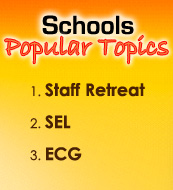Across time, space, culture and size, every organisation that stands out has two core ingredients – Great Leaders and a Culture of Learning. Individual and corporate fulfilments come from growth which often traces back to learning. Conversely, the end of learning is the beginning of decline. It is no wonder the top organisations are the very same ones who invest significantly and regularly on staff development.
More than half of the training that takes place, however, is yielding low or no returns on investment. As a result, many HR, Learning or Training departments are experiencing challenges in promoting training workshops to the staff as well as convincing the management on why time and money have to be set aside for staff development.
For staff training and development to be effective, there are three essential principles to hold firmly to. It is this philosophy in training that helps keep our clients’ level of satisfaction consistently at its highest.
Principle #1 – There Must Be Holistic Engagements (3H) in Training
Human beings are entities with a mind, soul and body. Unless and until we engage all these three elements during training, the result is likely to be less than desirable. Far too often employees dread training because they are bored by the rattling and information overload from the “lecturers”. The other extreme is the instructional and hands on training where staff are expected to do as they are told and their opinions do not matter. The third common type is the motivational workshop where staff passion gets fired up but very little is covered on practical strategies and relevant applications relating to their work environment.
To ensure holistic engagements in every training session, Luminaries Lab carefully and skilfully puts together various components to engage Heads, Hearts and Hands.
Heads
Engaging minds through useful findings from researches, statistics, theories and reports. The aim is to satisfy the logical mind with firm principles and rationale.
Hearts
Engaging emotions through powerful stories, illustrations and experiential activities. The aim is to instil a passion and motivation on top of the findings acquired.
Hands
Engaging actions through reflection, audit, assessment, planning and commitment. The aim is to increase the probability of implementing what they have learned.
Through the years, Luminaries Lab has discovered that this holistic approach has received most affirmations and re-invitations as the staff are significantly impacted by the end of each session. It definitely requires a lot more preparation as it takes time to understand the existing culture as well as gaps before the training can be customised. This leads to the next important principle.
Principle #2 – Every Training Session Must Be Customised
There are a thousand and one configurations of organisation models, cultures and climates out there. This explains why many off-the-shelves training programmes produce poor or unsustainable results even though in itself, they can be a good programme. The reason is because standalone programmes often do not readily fit in seamlessly with organisations of different colours and sizes. Here are some common examples where the training yields poor results and, at times, even backfires:
- Mistake #1
Implementing 1-1 mentoring system in organisations that have matrix reporting structure i.e. the staff reports to more than one superior who are from different departments or sections. - Mistake #2
Embarking on 360-degree feedback appraisal system in conservative cultures where protocols are expected and rank distinctions are high. - Mistake #3
Organising teambuilding activities without first having the vision, mission and core values in place. - Mistake #4
Sending a department suffering from poor morale for skills training. - Mistake #5
Conducting B to C sales training for staff who are taking care of B to B sales.
There is simply no shortcut when it comes to planning for training. Every training must take into account the organisation model, culture and climate. For this reason, for every confirmed training booking, Luminaries Lab always insists on a Training Needs Analysis (TNA) or what is now preferably known as Learning Needs Analysis (LNA). It has worked so well that we no longer provide training proposals upon requests unless the training reservations are confirmed and the LNA is first carried out. For taking the narrow way, Luminaries Lab has earned the reputation of being an essential staff development plug-in for top organisations. A plug-in essentially enhances existing systems appropriately. It is outsourcing at its best.
A training company without consultancy as one of its core competencies is severely impaired in its ability to deliver real value in training. Call us a doctor, psychologist or chaplain for organisations, our goals are the same – healthy and stronger individuals, teams and organisations.
Principle #3 – Continuity is Key to Sustainable Growth and Greatness
We all know that stop-gap measures are important and required from time to time. However they do not go well with staff development. When it comes to training, good leaders do it because they recognise people as growing entities while the not-so-enlightened bosses do it because they see people as problems to be solved. While the former is reaping dividends from continuous staff training and development, the latter usually ends up spending more time dealing with high staff turnover. The cost of continuous nurturing may be high but the cost of not doing so is a lot higher.
While setting time and budget for regular training is good, having disconnected training programmes are detrimental. Haphazard training leads to haphazard growth. Most clients of Luminaries Lab know the importance we place on the training roadmap. Whether at individual, department or organisation level, there is a journey of desired growth or progress. The absence of such roadmaps is one of the greatest contributing factors to staff retention problems and succession failures. Hence our clients who lack such roadmaps are most appreciative when we help them draw one out as it provides clarity, conviction and confidence to move forward.
In organisations such as the civil service sector, there are regular movements at the top management level. Hence having a training roadmap for continuity is also especially useful and important. Many training programmes and initiatives require time to be cascaded down to the ground level and to take root. Unfortunately, far too often, new bosses or team leaders want to try something different. The changes are justified if the current system is faulty but not so if the purpose is to make their presence felt. Having a robust training roadmap may not totally eliminate ego driven changes but it certainly helps to significantly reduce such occurrences. Why? Great leaders often put the organisation’s need above theirs and are willingly to enhance the existing efforts rather than overhauling systems.
These three guiding principles underpin Luminaries Lab’s philosophy in training which in turn enables us to deliver long lasting training results and returns for our valued clients. Come onboard the ark if you have not.



